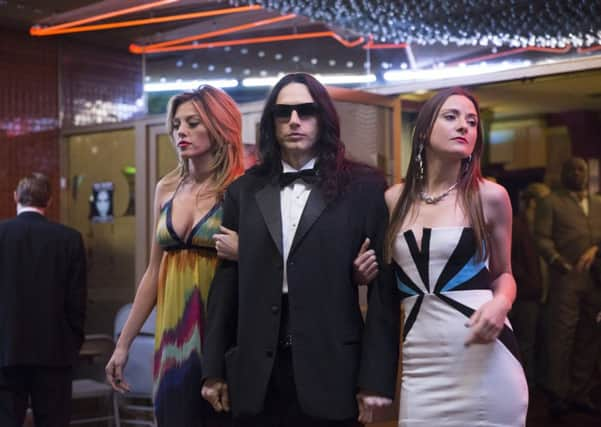Film reviews: The Disaster Artist | Happy End | Wonder | The Man Who Invented Christmas


The Disaster Artist (15) ****
Happy End (15) ****
Wonder (PG) **
The Man Who Invented Christmas (PG) ***
Hyped and heralded as the worst film ever made, there’s no getting round the fact that cult phenomenon The Room is a terrible movie that’s fascinating precisely because of the singular, bizarre vision of its creator, Tommy Wiseau. An accidental auteur of awfulness, his own semi-mythical status – no one seems to know exactly how old he is, where he’s from or how he made his money – has seen him likened to a modern day Ed Wood, the sort of figure whose artlessness has become an art form in its own right. What’s never been entirely clear, though, is how willingly Wiseau has embraced his film’s so-bad-its-good reputation. Sure, he’s managed to seize victory from the jaws of defeat by exploiting the willingness of fans to pack out late-night screenings and buy up The Room-related merchandise. But having poured his heart and six million dollars into the supposedly semi-autobiographical film, it must have stung to discover everyone just wanted to laugh at him.
Wherever the truth lies, he’s found a somewhat sympathetic champion in James Franco, whose new film The Disaster Artist dramatises the making of Wiseau’s magnum opus, turning the story behind it into funny but poignant tale of creativity and commitment in the absence of talent. Franco, who also directed the film, throws himself into the role too, treating Wiseau almost as a living art installation – there to disrupt and challenge the normal way of doing things, whether he’s making a movie, dancing in a club or hanging out with his best friend Greg Sestero (Dave Franco), a young aspiring fellow actor he meets in an acting class in San Francisco and promptly moves to LA with in order to pursue their shared dream of stardom together.
Advertisement
Hide AdWith both facing regular rejection, Tommy writes The Room as a showcase for both of them and promptly finances it himself, assuming complete creative control before anybody comprehends how lacking in basic filmmaking skill or acting ability he really is. The making of the film becomes a catalogue of hilarious mishaps, mistakes and misguided creative decisions. Even if you haven’t seen it, the shared incredulity of the cast and crew (played by a roster of A-list comedy and acting talent, including Seth Rogen, Alison Brie and Jackie Weaver) is not exaggerated: the film they’re making really does beggar belief. If you have seen The Room there’s additional joy in seeing the meticulous behind-the-scenes recreations of its most meme-worthy moments.
Nevertheless, the film isn’t just a series of potshots at a Wiseau. Franco is a bit of restless talent himself (he’s racked up 36 directing credits in the last decade, mostly for films no one has seen) and he’s sensitive to the way Tommy’s attempts to express himself are sometimes misguided attempts to replicate work he admires. One of the most famously bad scenes in The Room, for instance, has its origins in Rebel Without a Cause, and you start to feel for Tommy when you realise he’s trying to do James Dean without realising how melodramatic Dean’s line readings sounds by modern standards.
The film is full of grace notes like that. On one level it functions as a useful demolition job on the artist-as-savant myth that too many films and documentaries indulge, but on another it’s a reminder that even bad art can spring from and inspire compelling human stories.
Happy End is Michael Haneke’s latest ironically titled exercise in cinematic hostility and, in some respects, it’s very much business as usual as he starts picking once again at the scab of bourgeois privilege. But if this has made his films a little tiresome of late, there’s something divinely unsettling about this new one. Like Benny’s Video and Hidden, it begins with a queasy moment of surveillance, with Haneke finding new ways to ratchet up fears about the use of social media before zeroing in on another wealthy dysfunctional family, this one living in the shadow of the immigration crisis in Calais. Blithely indifferent to the suffering of anyone outside their immediate circle, and barely on speaking terms with each other, the family – presided over by Isabelle Huppert’s no-nonsense matriarch –seems to be one tiny act of aggression away from imploding altogether, something Haneke turns into a satirical comment on the futility of trying to maintain such a broken social system.
“When there’s a choice between being right and being kind, choose kind,” says a character in Wonder. No doubt the filmmakers will be hoping anyone who sees this heart-tugger about a facially deformed kid will follow suit, embracing the many positive messages it espouses rather than focusing on the many broadly manipulative ways it tries to extract tears from you. Caked in prosthetics, Room’s Jacob Tremblay is fine, if a little cloying, as its ten-year-old hero, but the film relies on Julia Roberts and Owen Wilson (cast as Auggie’s over-protective parents) doing their twinkly movie-star thing instead of exploring the family’s situation in any meaningful way.
As Ricky Gervais once put it: the only way to improve A Christmas Carol is with Muppets. In lieu of Kermit and co, The Man Who Invented Christmas makes a so-so fist of freshening up Charles Dickens’s much-adapted tale by dramatising its writing and turning it into a sort of spot-the-influence parlour game. Dan Stevens is on lively form as Dickens, but while no turkey, the end result is mostly a lot of whimsical nonsense. ■